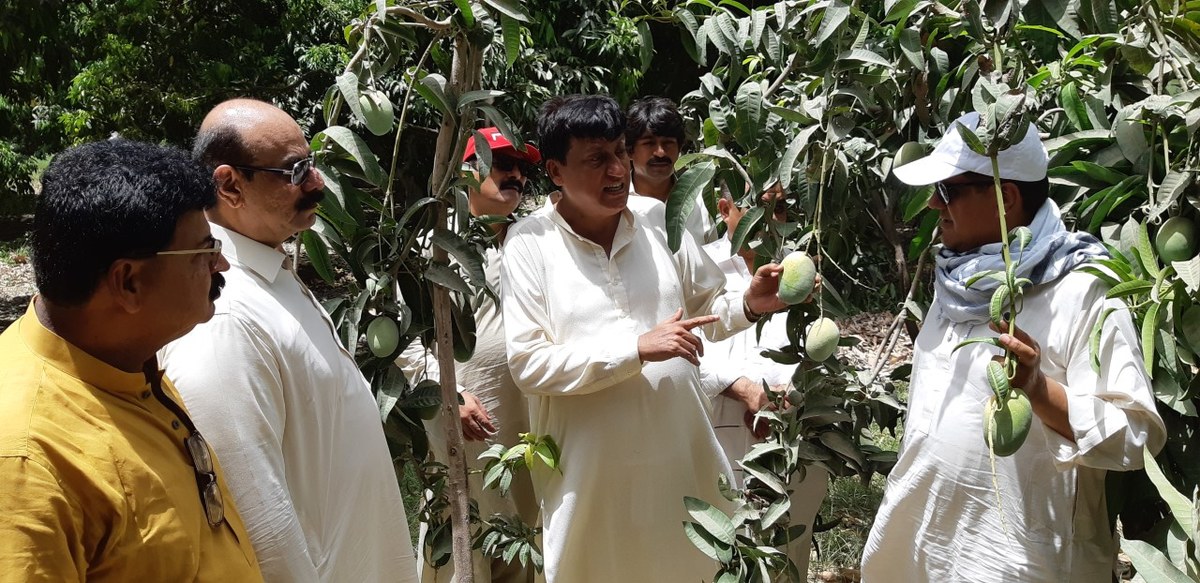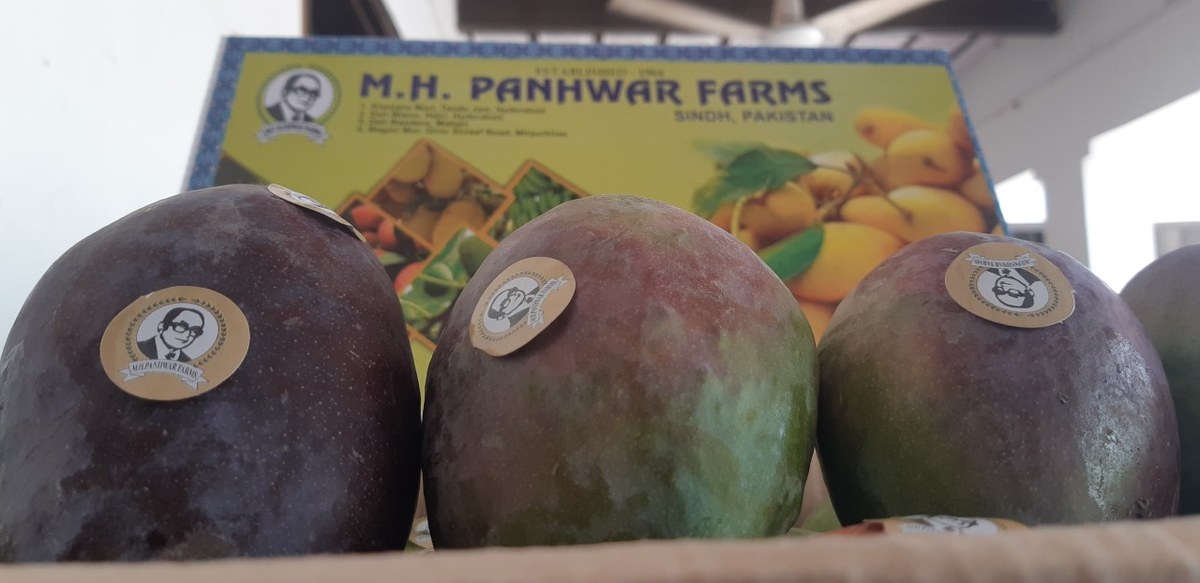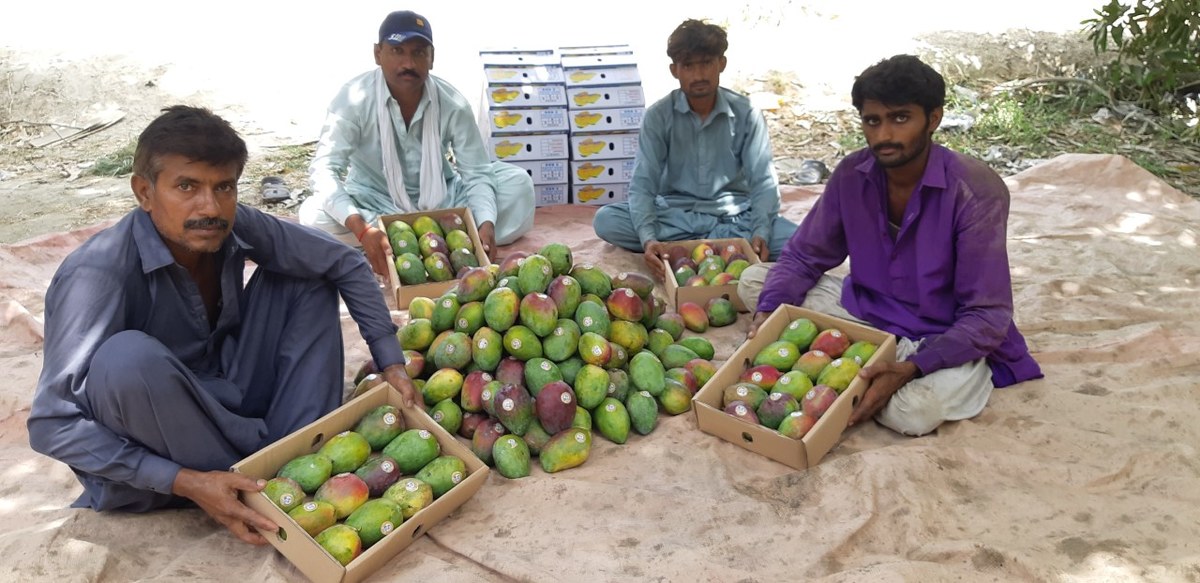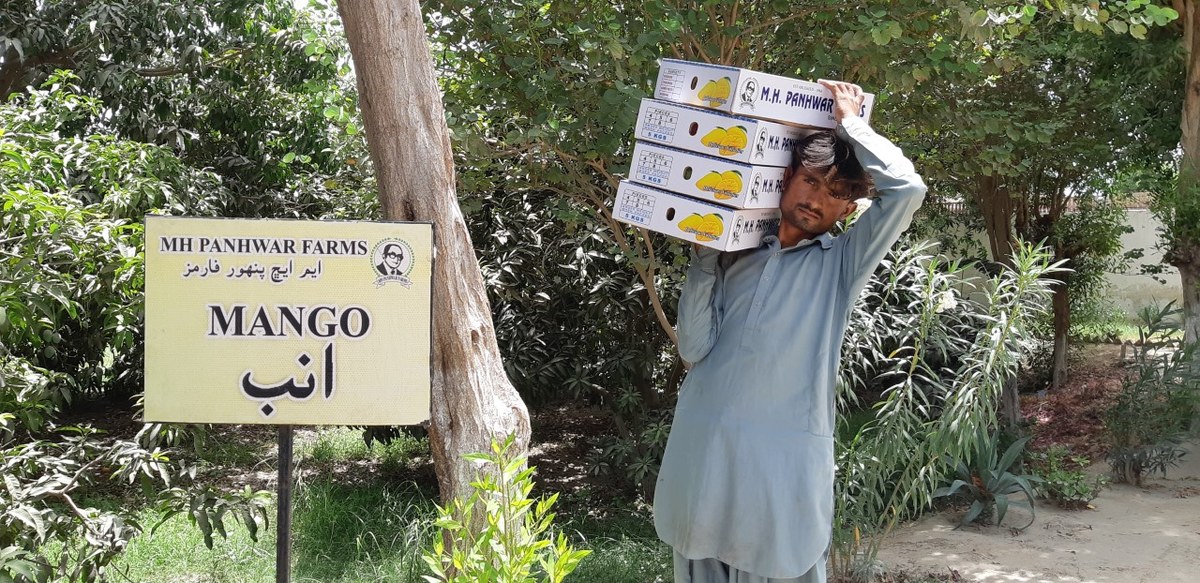TANDO JAM, SINDH: A farmer in Sindh, Ghulam Sarwar Panhwar, says he has created a new variety of “low sugar” mangoes that are safer for diabetics, but scientists are advising caution, saying the connection between food having lower sugar levels and being diabetes-friendly is not so straightforward.
Panhwar owns M. H. Panhwar Farms in Tando Jam, Hyderabad district in the southern Sindh province. The Pakistan Agricultural Research Council’s Food Quality and Safety Research Institute in Karachi, which tested the Keitt, Big Sunhero, and Glenn mango varieties created by Panhwar’s farms, says they have between 4.7 to 6 percent sugar. In comparison, the popular Sindhri variety for which his farm is famous has a sugar level at 12.8 percent.
Mangoes are usually high in sugar, giving them the potential to raise blood sugar levels — a particular concern for people with diabetes.

Ghulam Sarwar Panhwar (second right), co-chairman of M.H. Panhwar Farms, points towards a mango in Tando Jam, in Pakistan’s Sindh province, on June 16, 2021. (AN photo by Zulfiqar Kunbhar)
But when Panhwar introduced his new varieties in the market last month, he advertised them as being suitable for people with diabetes on account of their lower sugar levels.
But Dr. Najum F. Mahmudi, an executive committee member and diabetologist at the Pakistan Medical Association, said lower sugar levels alone could not be used to judge if Panhwar’s mangoes were safer for diabetics.
“Since the grower’s claim is to have produced low-sugar mangoes, these fruits may be less harmful,” Mahmudi said. “However, [it] may not be fully permissible [for diabetics]. You cannot stamp any mango that it is fit for diabetics just on the basis of low sugar level.”

Mangoes on display at M.H. Farms in Tando Jam, in Pakistan’s Sindh province, on June 16, 2021. (AN photo by Zulfiqar Kunbhar)
“A lot also depends on a particular diabetes patient, how he or she controls his or her sugar levels,” the doctor added. “If the sugar level is under control, diabetics may eat a small amount of mango.”
Mahmudi said a clinical trial was necessary to determine the impact of the so-called low sugar mangoes on diabetics.

Workers pack mangoes in boxes at M. H. Farms Tando Jam, in Pakistan’s Sindh province, on June 16, 2021. (AN photo by Zulfiqar Kunbhar)
Diabetologist Dr. Zeeshan Ali, an associate professor of medicine at Jinnah Post Graduate Medical Center (JPMC) in Karachi, concurred with Mahmudi, saying clinical tests would make it possible to determine both the glycemic index (GI) and glycemic load (GL) of the fruit.
“There are two things we have to look into in terms of glucose control; one is glycemic load (GL), that is how much total glucose content a certain quantity of the item would contain, and glycemic index (GI), how fast it increases blood glucose levels,” he said. “For a diabetic patient, both things are important, not just one.”
Prof. M. Zaman Shaikh, joint secretary of the Diabetic Association of Pakistan, was even less optimistic about Panhwar’s claims: “In my opinion, the grower’s claim has more commercial aspect and no scientific basis.”

A worker carrying a box of mangoes walks past a sign board for M. H. Farms in Tando Jam, in Pakistan’s Sindh province, on June 16, 2021. (AN photo by Zulfiqar Kunbhar)
But Panhwar said he was ready for a clinical trial of the mangoes, calling on the government to conduct the tests. Sindh Agriculture Minister Muhammad Ismail Rahoo did not respond to repeated phone calls from Arab News seeking comment for this piece.
In the meantime, Panhwar says he is planning to double the cultivation area for the new varieties, given high demand in both the local and international markets.
“Following demand for these mangoes in the local and international market, especially the Middle East, we are going to extend our cultivation area from this year,” he said. “Presently we have 25 acres, and we are going to almost double to more than 50 acres next year.”















